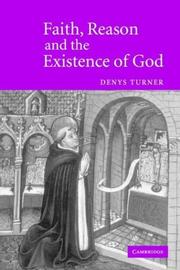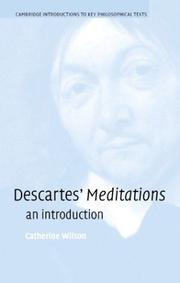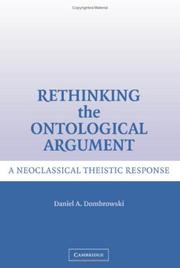| Listing 1 - 10 of 16 | << page >> |
Sort by
|
Book
ISBN: 1282749625 9786612749629 0748634819 9780748634804 0748634800 9780748634811 6612749628 Year: 2010 Publisher: Edinburgh Edinburgh University Press
Abstract | Keywords | Export | Availability | Bookmark
 Loading...
Loading...Choose an application
- Reference Manager
- EndNote
- RefWorks (Direct export to RefWorks)
Descartes' Meditations is one of the first texts that a philosophy student will study, and one that many come back to time and again. Rather than simply telling the reader what to think, Meditations invites us to take a philosophical journey. This book prepares readers for that journey, helping them to engage with each of the meditations and suggesting ways through the more difficult passages. This guide also offers students a fresh approach by bringing to life the path of self-discovery encapsulated in the work, while maintaining the emphasis on metaphysics. By focusing on what the text itsel
First philosophy. --- God --- Ontological argument --- Ontology --- Metaphysics --- Proof, Ontological. --- Descartes, René, --- Descartes, Rene,

ISBN: 0521602564 0521841615 9780521841610 9780521602563 9780511617317 0511230346 9780511230349 0511228708 9780511228704 0511229542 9780511229541 9780511231117 0511231113 0511617313 1280702400 9781280702402 1107163129 9781107163126 0511316445 9780511316449 9786610702404 6610702403 Year: 2004 Publisher: Cambridge Cambridge University Press
Abstract | Keywords | Export | Availability | Bookmark
 Loading...
Loading...Choose an application
- Reference Manager
- EndNote
- RefWorks (Direct export to RefWorks)
The proposition that the existence of God is demonstrable by rational argument is doubted by nearly all philosophical opinion today and is thought by most Christian theologians to be incompatible with Christian faith. This book argues that, on the contrary, there are reasons of faith why in principle the existence of God should be thought rationally demonstrable and that it is worthwhile revisiting the theology of Thomas Aquinas to see why this is so. The book further suggests that philosophical objections to proofs of God's existence rely upon an attenuated and impoverished conception of reason which theologians of all monotheistic traditions might wish to reject. Denys Turner proposes that on a broader and deeper conception of it, human rationality is open to the 'sacramental shape' of creation as such and in its exercise of rational proof of God it in some way participates in that sacramentality of all things.
God --- Dieu --- Proof, Ontological. --- Existence --- Preuve ontologique --- Ontological argument --- Ontology --- Proof, Ontological --- Arts and Humanities --- Religion --- God - Proof, Ontological.
Book
ISBN: 3787320423 3787318879 Year: 2008 Publisher: Hamburg [Germany] : F. Meiner,
Abstract | Keywords | Export | Availability | Bookmark
 Loading...
Loading...Choose an application
- Reference Manager
- EndNote
- RefWorks (Direct export to RefWorks)
Hauptbeschreibung In den ""Meditationes de prima philosophia"" (1642) geht es Descartes um eine neue Grundlegung der Metaphysik. Dieser Neuanfang in der Philosophie, den Descartes wie wohl kaum ein anderer propagiert und durchführt, hat jedoch einen konservativen Zug: Gerade Descartes besteht darauf, daß seine Philosophie die älteste ist, die es überhaupt geben kann, und diese Aussage hat nur Sinn, wenn Metaphysik als Rekonstruktion der ursprünglichen Fragen verstanden wird, die anfänglich das philosophische und insbesondere metaphysische Geschäft ins Rollen gebracht hatten.
Christian life. --- Meditations. --- Spiritual life. --- Philosophy & Religion --- Philosophy --- First philosophy. --- God --- Proof, Ontological. --- Ontological argument --- Ontology --- Metaphysics
Book
ISBN: 9780521191388 9781139042895 9781107576353 9781107336179 1107336171 0521191386 1107223016 1107335345 1107332850 1107332222 1107334519 1139042890 1107576350 Year: 2013 Publisher: Cambridge Cambridge University Press
Abstract | Keywords | Export | Availability | Bookmark
 Loading...
Loading...Choose an application
- Reference Manager
- EndNote
- RefWorks (Direct export to RefWorks)
Descartes's Meditations on First Philosophy, published in Latin in 1641, is one of the most widely studied philosophical texts of all time, and inaugurates many of the key themes that have remained central to philosophy ever since. In his original Latin text Descartes expresses himself with great lucidity and elegance, and there is enormous interest, even for those who are not fluent in Latin, in seeing how the famous concepts and arguments of his great masterpiece unfold in the original language. John Cottingham's acclaimed English translation of the work is presented here in a facing-page edition alongside the original Latin text. Students of classical philosophy have long had the benefit of dual-language editions, and the availability of such a resource for the canonical works of the early-modern period is long overdue. This volume now makes available, in an invaluable dual-language format, one of the most seminal texts of Western philosophy.
First philosophy. --- God --- Methodology. --- Knowledge, Theory of. --- Epistemology --- Theory of knowledge --- Philosophy --- Psychology --- Research --- Ontological argument --- Ontology --- Metaphysics --- Proof, Ontological. --- Methodology --- Arts and Humanities --- Humanities Methodology

ISBN: 1107132088 9786612387159 0511643330 1282387154 0511805004 0511204256 0511078080 0511561512 0511076517 9780511078088 0511074972 9780511074974 9780511076510 9780511805004 0521809819 9780521809818 0521007666 9780521007665 9781107132085 6612387157 9780511643330 9781282387157 9780511204258 9780511561511 Year: 2003 Publisher: Cambridge, U.K. ; New York : Cambridge University Press,
Abstract | Keywords | Export | Availability | Bookmark
 Loading...
Loading...Choose an application
- Reference Manager
- EndNote
- RefWorks (Direct export to RefWorks)
In this introduction to a classic philosophical text, Catherine Wilson examines the arguments of Descartes' famous Meditations, the book which launched modern philosophy. Drawing on the reinterpretations of Descartes' thought of the past twenty-five years, she shows how Descartes constructs a theory of the mind, the body, nature, and God from a premise of radical uncertainty. She discusses in detail the historical context of Descartes' writings and their relationship to early modern science, and at the same time she introduces concepts and problems that define the philosophical enterprise as it is understood today. Following closely the text of the Meditations and meant to be read alongside them, this survey is accessible to readers with no previous background in philosophy. It is well-suited to university-level courses on Descartes, but can also be read with profit by students in other disciplines.
First philosophy. --- Metaphysics. --- God --- Ontological argument --- Ontology --- Philosophy --- Philosophy of mind --- Metaphysics --- Proof, Ontological. --- Descartes, René, --- First philosophy --- Proof, Ontological --- Arts and Humanities --- Descartes, Rene,
Book
ISBN: 1281769851 9786611769857 0191539716 9780191539718 0192806963 9780192806963 9780192806963 Year: 2008 Publisher: Oxford Oxford University Press
Abstract | Keywords | Export | Availability | Bookmark
 Loading...
Loading...Choose an application
- Reference Manager
- EndNote
- RefWorks (Direct export to RefWorks)
In Descartes's Meditations, the thinker rejects all his former beliefs in the quest for new certainties. He develops new conceptions of body and mind to create a new science of nature. This new translation includes a wide-ranging, accessible introduction, notes and full selections from the Objections and Replies. - ;'It is some years now since I realized how many false opinions I had accepted as true from childhood onwards...I saw that at some stage in my life the whole structure would have to be utterly demolished'. In Descartes's Meditations, one of the key texts of Western philosophy, the t
First philosophy. --- God --- Methodology. --- Knowledge, Theory of. --- Epistemology --- Theory of knowledge --- Philosophy --- Psychology --- Research --- Ontological argument --- Ontology --- Metaphysics --- Proof, Ontological. --- Methodology --- Humanities Methodology
Book
ISBN: 1474428223 1474438644 9781474428224 9781474428194 1474428193 Year: 2017 Publisher: Edinburgh Edinburgh University Press
Abstract | Keywords | Export | Availability | Bookmark
 Loading...
Loading...Choose an application
- Reference Manager
- EndNote
- RefWorks (Direct export to RefWorks)
Rethinks cinematic journeys through history, globalisation, form and genre.
God --- Reason. --- Necessity (Philosophy) --- Contingency (Philosophy) --- Philosophy --- Causation --- Chance --- Fate and fatalism --- Ontology --- Teleology --- Truth --- Mind --- Intellect --- Rationalism --- Ontological argument --- Proof, Ontological.

ISBN: 9780511498916 9780521863698 9780521326353 9780511226458 0511226454 0521863694 0511498918 1280550570 9781280550577 0521863694 0521326354 1107169070 0511225881 0511224605 0511317883 051122527X Year: 2006 Publisher: Cambridge New York Cambridge University Press
Abstract | Keywords | Export | Availability | Bookmark
 Loading...
Loading...Choose an application
- Reference Manager
- EndNote
- RefWorks (Direct export to RefWorks)
In recent years, the ontological argument and theistic metaphysics have been criticised by philosophers working in both the analytic and continental traditions. Responses to these criticisms have primarily come from philosophers who make use of the traditional, and problematic, concept of God. In this 2006 volume, Daniel A. Dombrowski defends the ontological argument against its contemporary critics, but he does so by using a neoclassical or process concept of God, thereby strengthening the case for a contemporary theistic metaphysics. Relying on the thought of Charles Hartshorne, he builds on Hartshorne's crucial distinction between divine existence and divine actuality, which enables neoclassical defenders of the ontological argument to avoid the familiar criticism that the argument moves illegitimately from an abstract concept to concrete reality. His argument, thus, avoids the problems inherent in the traditional concept of God as static.
God --- Process theology --- Theism --- Philosophy --- Religion --- Atheism --- Misotheism --- Panentheism --- Theology, Process --- Theology, Doctrinal --- Ontological argument --- Ontology --- Proof, Ontological --- Theism. --- Process theology. --- Proof, Ontological. --- Arts and Humanities
Book
ISBN: 0823298868 Year: 2022 Publisher: Fordham University Press
Abstract | Keywords | Export | Availability | Bookmark
 Loading...
Loading...Choose an application
- Reference Manager
- EndNote
- RefWorks (Direct export to RefWorks)
A Reader in Early Franciscan Theology presents for the first time in English key passages from the Summa Halensis, one of the first major installments in the summa genre for which scholasticism became famous. This systematic work of philosophy and theology was collaboratively written mostly between 1236 and 1245 by the founding members of the Franciscan school, such as Alexander of Hales and John of La Rochelle, who worked at the recently founded University of Paris.Modern scholarship has often dismissed this early Franciscan intellectual tradition as unoriginal, merely systematizing the Augustinian tradition in light of the rediscovery of Aristotle, paving the way for truly revolutionary figures like John Duns Scotus. But as the selections in this reader show, it was this earlier generation that initiated this break with precedent. The compilers of the Summa Halensis first articulated many positions that eventually become closely associated with the Franciscan tradition on issues like the nature of God, the proof for God’s existence, free will, the transcendentals, and Christology. This book is essential reading for anyone wishing to understand the ways in which medieval thinkers employed philosophical concepts in a theological context as well as the evolution of Franciscan thought and its legacy to modernity.A Reader in Early Franciscan Theology is available from the publisher on an open-access basis.
Theology, Doctrinal --- PHILOSOPHY / Religious. --- Alexander of Hales. --- Christology. --- Franciscan. --- John of La Rochelle. --- Trinity. --- divine infinity. --- free will. --- medieval philosophy. --- medieval theology. --- moral law. --- ontological argument. --- transcendentals.
Book
ISBN: 9780199263356 0199263353 0191741779 019873896X 0191654876 1283639513 9780191654879 9781283639514 6613951978 9786613951977 9780191741777 Year: 2012 Publisher: Oxford Oxford University Press
Abstract | Keywords | Export | Availability | Bookmark
 Loading...
Loading...Choose an application
- Reference Manager
- EndNote
- RefWorks (Direct export to RefWorks)
Brian Leftow offers a theist theory of necessity and possibility, and a new sort of argument for God's existence. He argues that necessities of logic and mathematics are determined by God's nature, but that it is events in God's mind - his imagination and choice - that account for necessary truths about concrete creatures.
God --- Necessity (Philosophy) --- Possibility. --- Dieu --- Nécessité (Philosophie) --- Possibilité --- Proof, Ontological. --- Existence --- Preuve ontologique --- Nécessité (Philosophie) --- Possibilité --- Possibility --- Theism --- Philosophy --- Religion --- Atheism --- Misotheism --- Panentheism --- Logic --- Causation --- Chance --- Fate and fatalism --- Ontology --- Teleology --- Truth --- Ontological argument --- Proof, Ontological --- Theism.
| Listing 1 - 10 of 16 | << page >> |
Sort by
|

 Search
Search Feedback
Feedback About UniCat
About UniCat  Help
Help News
News